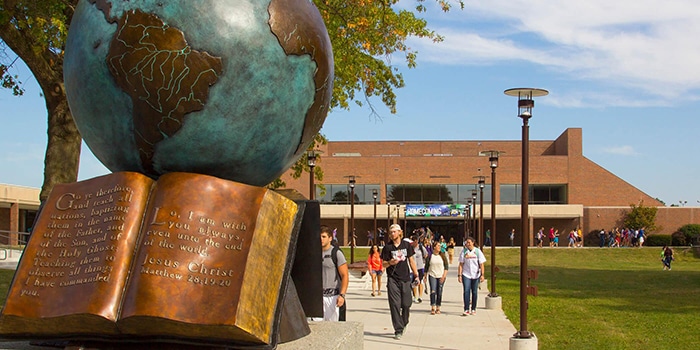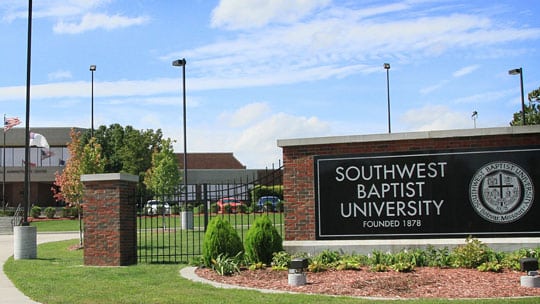
Amid a public controversy surrounding the firing of a Baptist college professor who allegedly first sought to oust other professors, multiple professors recently released statements. Much of the debate, which has spread nationally, centers on various doctrinal claims and the nature of theological education.

Southwest Baptist University campus in Bolivar, Mo. (Photo: SBU)
On Nov., 28, the president and provost at Southwest Baptist University in Bolivar, Mo., fired Clint Bass, a tenured associate professor of theology and philosophy, after he allegedly met with Missouri Baptist Convention leaders over multiple years in an effort to drive out other professors. According to the dismissal letters and documents released by Bass on Dec. 17, he collected statements by his colleagues he disagreed with and met with outside individuals without taking his concerns to his colleagues or administrators.
After Bass appealed his dismissal, the educational policies and personnel committee of SBU’s Board of Trustees held a five-hour hearing on Dec. 21. (No decision from that hearing has been announced.) SBU confirmed that hearing later that day in a statement to Word&Way.
“The employee was given the opportunity to address the committee and provide information the employee deemed relevant to the notice as to his conduct,” the statement noted. “An expectation exists that those interested will have the wisdom to respect the process and not to pre-judge nor reach conclusions without all the facts and information. Please continue to pray and recognize the extreme hardship on every person who is directly or indirectly involved in this process.”
Bass also released a statement that day criticizing the appeals hearing. He complained that witnesses he brought “were never allowed to enter the room,” though it was unclear if the committee had previously said witnesses would be allowed. He also complained that “the Committee demanded I agree to keep the appeal process secret.” SBU has offered few comments on the case because of the required privacy involved in personnel matters — and SBU’s statements only refer to an “employee” instead of naming Bass.
He said that he took questions for several hours from SBU’s attorney, until he “told the committee that I would not answer further questions without an agreement for a fair process and attorney.” He added he is “grieved” by the format of the hearing.
“A focus was my communications with other Missouri Baptists, and whether those communications were immoral,” Bass noted.
The next day, SBU announced the creation of an “external peer assessment committee” to “lead a University-wide dialogue regarding faith and learning.” Southern Baptist scholar David Dockery, president of Trinity International University in Deerfield, Ill., and former president of Union University in Jackson, Tenn., will lead the committee.
“We welcome the Committee’s assessment as an integral process to better articulate who we are and to effectively provide a Christian higher education while remaining loyal to our Baptist heritage,” SBU’s statement added. “We believe that the result will be an SBU that is even more firmly grounded in the core values that have defined us since our inception.”
Redford Professors Respond
A few days after the release of documents from Bass accusing his former colleagues of holding views he found heretical, SBU officials told faculty in SBU’s Redford College they could now respond. Rodney Reeves, dean of Redford and a key target of Bass’s attacks, issued a public statement on Facebook on Dec. 21. Reeves argued Bass “violated the ninth commandment” by bearing false witness. Reeves then rebutted several claims made by Bass that Reeves called “lies” and “malicious attacks.”
Reeves particularly criticized Bass for not approaching him with concerns. Reeves said if he had concerns about what a student said another professor taught, he would approach that colleague.
“What is especially frustrating to me is that most of Clint’s accusations were based on hearsay from a few students,” Reeves added. “How do I know that? He admitted it in a document he presented to President [Eric] Turner and Provost [Lee] Skinkle. Never once did he ever discuss these things with me. Never once did he ask me what I believe about these things.”
“He chose, instead, to call into question my theological integrity by spreading lies about me,” Reeves added. “The damage that has been done to me, my family and friends, my colleagues at SBU, the administration and the entire university will be evident for years. When it comes to higher theological education, some people tend to want to believe the worst about you.”
The next day, on Dec. 22, another Redford professor attacked by Bass also responded. Zach Manis, who teaches philosophy, wrote a guest post on Reeves’s blog. Manis argued Bass was not fired because of theology but “for gross professional misconduct.”
“His intention, as best I can tell, was to get most of the theology faculty of Redford College fired, myself included, by any means necessary, and arrange to have us replaced by those who share his narrow and intolerant version of Christian theology in its most minute detail,” Manis explained as he criticized what he called “the smear campaign against Redford College.”
He called Bass’s actions “seditious and quite treacherous,” noting that the attacked professors had previously voted to hire, promote and support Bass.
“Bass borrowed a page from one of his research interests, the Puritans — the worst possible page, I’m afraid,” Manis added. “He planned, organized and did everything in his power to carry out a witch hunt. He seems to have convinced himself that all of these actions are justified, and even noble, insofar as they were done in the name of God and the advancement of doctrinal purity. But it is a dark thought that treachery is justified in the service of a good and righteous cause.”
Manis also noted that some of the statements Bass used to attack him were from conversations when Manis sought out Bass’s expertise as Manis worked on a book project. Manis explained that rather than posing “settled theological convictions” in those conversations, he was instead seeking “to figure something out.”
“This is the way that philosophers go about trying to answer hard questions,” he explained. “We engage in a dialectic — a back-and-forth discussion in which all sides of an issue are presented, defended and critiqued—in order to assess the relative merits and strengths of various possible solutions.”
Manis complained that after Bass misinterpreted those conversations, Bass did not address those concerns to Manis but instead started a “collection of secret notes.”
“He behaved, not like a brother in Christ, but like a secret agent in a police state, assigned the task of continual surveillance of his peers, for the purpose of trying to amass evidence by which they might someday be prosecuted for supposed thought crimes,” Manis added. “This is not, let us say, a clear depiction of the Pauline admonition to believers given in 1 Corinthians 13.”
Manis included in his response a consideration of the nature of theological education, which he argued is not for “indoctrination” but to help students learn “to think for themselves.” He added that college should not be “a glorified daycare for overgrown children” but a place where students are “engaging in rigorous and serious philosophical and theological reflection” and “forming their own views on these matters in a careful and responsible way.”
“A diversity of theological opinions on the minor issues (again, not on the fundamental doctrines, but on the secondary and tertiary issues) is part of what makes a department of Christian theology vibrant,” he wrote.
Outside Professors Defend Bass
Prior to the appeals hearing and the statements by Reeves and Manis, four professors at other Southern Baptist institutions wrote public letters of support for Bass. The letters focus on defending Bass’s desire that Redford professors be required to follow the Baptist Faith & Message 2000. The letters each appear to accept Bass’s allegations against his colleagues as accurate.
Tom Nettles, a longtime historical theology professor at Southern Baptist Theological Seminary in Louisville, Ky., admitted in his letter that he was “not sure that I have met Dr. Bass,” but still wrote to urge “doctrinal fidelity.” Nettles wrote that, based on the dismissal documents about Bass’s actions, he “understood why any person who had done those things would be an undesirable in an institution that sought to foster genuine collegiality among its faculty.” Yet, Nettles added he questioned if the “termination is legitimate” since he sees “something larger than amicable relationships was at stake.” Thus, he urged that Bass be kept at SBU, and called for “a close investigation” of “some other professors.”
Malcom Yarnell, a systemic theology professor at Southwestern Baptist Theological Seminary in Fort Worth, Texas, wrote that “as a former Missouri Baptist and a continuing Southern Baptist” he was “shocked” to hear of Bass’s firing. Having met Bass a few times and read some of Bass’s scholarship, Yarnell expressed his concern “not only for [Bass’s] personal welfare but also for the long-term loss that Dr. Bass’s dismissal represents to the cause of theological education.” Yarnell also urged Missouri Baptists to act “as they face this crisis” to make sure SBU requires “its professors to embrace a substantial Baptist confession.”
The third supporting letter was co-written by two professors at Boyce College, the undergraduate school of Southern Baptist Theological Seminary: Jonathan Arnold (a former doctoral classmate of Bass) and Tyler Flatt. They wrote they were “deeply saddened” by “the grievous error” in dismissing Bass, arguing Bass “has always demonstrated himself to be a man of utmost moral character, a supernatural result of his relationship with the Triune God which rightly spurs other believers to a deeper level of sanctification.” In response that Bass’s actions violated ethical and professional cannons of conduct for professors, Arnold and Flatt argued he instead followed “the obviously overriding ethical mandate of defending the historic Christian faith and of protecting the interests of affiliated entities, in this case the Missouri Baptist Convention.”
The SBU trustee subcommittee that held the appeals hearing is expected to announce its decision in January. The MBC did not respond to Word&Way’s request for comment.
See also:

